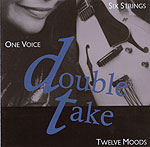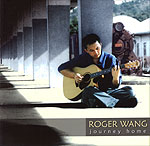
Would somebody please discover these two?
|
This review first appeared in the Autumn 2003 issue of Turbula.
Where's John Hammond when we need him?
Well, he's dead of course, but someone else needs to step up – to go out and discover musicians not currently on Hollywood's radar screen. It was Hammond who made a career as Columbia's top talent man by driving around the country looking – listening, actually – for new music to bring to the public. In this manner, he found Benny Goodman and Billie Holiday, Count Basie and Stevie Ray Vaughn, Bob Dylan and Bruce Springsteen.
These days, the American bushings are pretty well beat; be hard to find a band that's had the time to percolate and grow without being found by the major labels – but there's a load of talent elsewhere just waiting to be discovered by the American public.
Roger Wang and Mia Palencia, for instance.
They hail from Sabah, on Borneo, although they spend much of their time performing in Kuala Lumpur these days. That'd be Malaysia, before you start leafing through the atlas.
And they are creating some of the very best jazz anywhere on the planet, both together as Double Take and Wang solo.
Which is extraordinary not only for their rather remote location from the American birthplace of jazz, but also for Palencia's tender years. Only just turned 19 as we write this, her first two recording sessions – released together on the two-disc "One Voice, Six Strings, Twelve Moods" – show a jazz singer of remarkable presence and vision. Genius, perhaps. (The U.S. release only contains the studio recordings, not the live, and is titled "DoubleTake".)
Laugh if you will, but at least listen to her live version of "Almost Like Being in Love/L.O.V.E.". She shapes her notes with a knowing prowess that most singers twice her age have yet to master. She can insert a growl into a passage without ever losing her place, without affectation or seeming forced.
And spaces. While most young singers tend to rush, to hurry, anything to fill in every single second, Palencia caresses the empty spaces as much as the notes she does sing. Uses them for emphasis, for punctuation.
Perhaps more important even than the purity of her tone or the near-perfection of her timing is the sense of wide-open abandon Palencia brings to her singing. She's clearly enjoying herself, just letting it hang out there, trusting both Wang and the audience. On her live version of "Black Coffee," she's as relaxed as a singer can be and turns in a reading you won't soon get out of your head. It's almost like listening to a young Ella Fitzgerald – Palencia is just having fun, celebrating the joy of singing. And like a young Ella, it's likely that Palencia does not yet have any idea of just how very good she is.
Our gushing over Palencia's startling talent shouldn't be taken as a dismissal of Wang's own considerable chops. A guitarist straddling folk and jazz a la John Fahey or Leo Kottke, Wang displays an absolute mastery over his instrument, able to pull sounds out that most who pick up the guitar can only dream about.
Like Palencia, Wang has a Sinatraesque ability to use space every bit as much as his notes to shape a song. Whether accompanying Palencia or playing solo on his "Journey Home" album, his playing is consistently of the highest order.
While he credits Tuck Andress (of Tuck & Patty) as an influence, a more apt comparison might be Bob Brozman. Like Brozman, Wang pulls in all kinds of different influences to his playing – in Wang's case, the influences range from jazz and blues to Hawaiian and Chinese.
Strumming and picking, moving instantaneously from chords to five-finger picking, Wang is one with his guitar – a single entity creating sounds of pure magic.
Look, we realize that John Hammond is dead – but someone out there in Hollywood must be smart enough to take a chance on Palencia and Wang, to sign them to a U.S. distribution deal, bring them stateside for a tour. Hollywood may like blaming online music piracy for its declining sales, but our guess is that if the music suits would offer the public more artists like these two and fewer Mariah Careys, they might turn those declining sales around.


